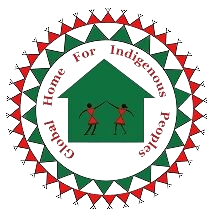GH4IP in Nagpur with Adivasi Vichar Manch
International Conference of Indian Indigenous Peoples of India for the Recognition and Rights in UN
October 15, 2022
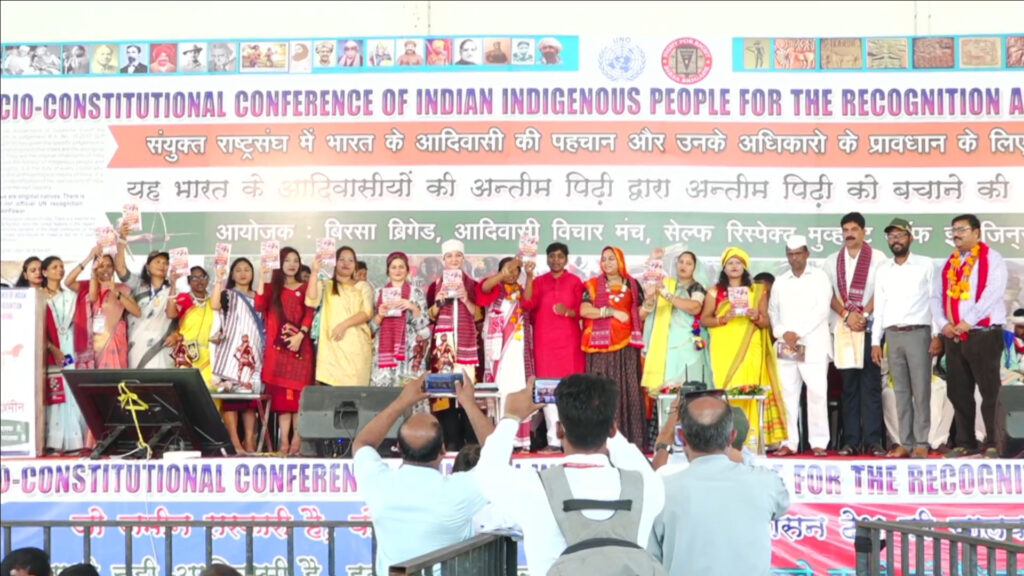
On behalf of Global Home for Indigenous Peoples, I was invited as to speak at the International Conference of Indian Indigenous Peoples for the recognition and rights in the UN. The conference was one of the largest gatherings of Indian Indigenous Peoples and their leaders in Nagpur. Among the dignitaries, Mr. Phoolman Chaudhary, Vice-Chair of the UN Permanent Forum on Indigenous Issues (UNPFII), Dr. Haneih Moghani (legal advisor of CENESTA, Iran and the incoming Asia member of UNPFII) also attended the conference. The Vice-Chair of UNPFII and the incoming Asia member of UNPFII gave their commitment to support the Indigenous Peoples of India in voicing their struggles at the United Nations. The solidarity shown by all the Indigenous leaders at the conference gave a lot of hope to the Indigenous Peoples of India.
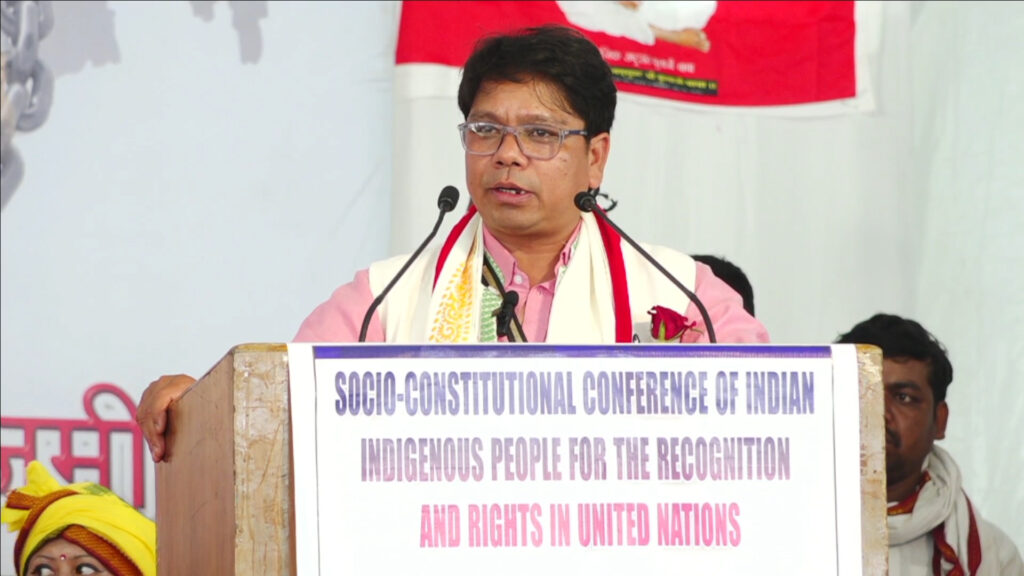
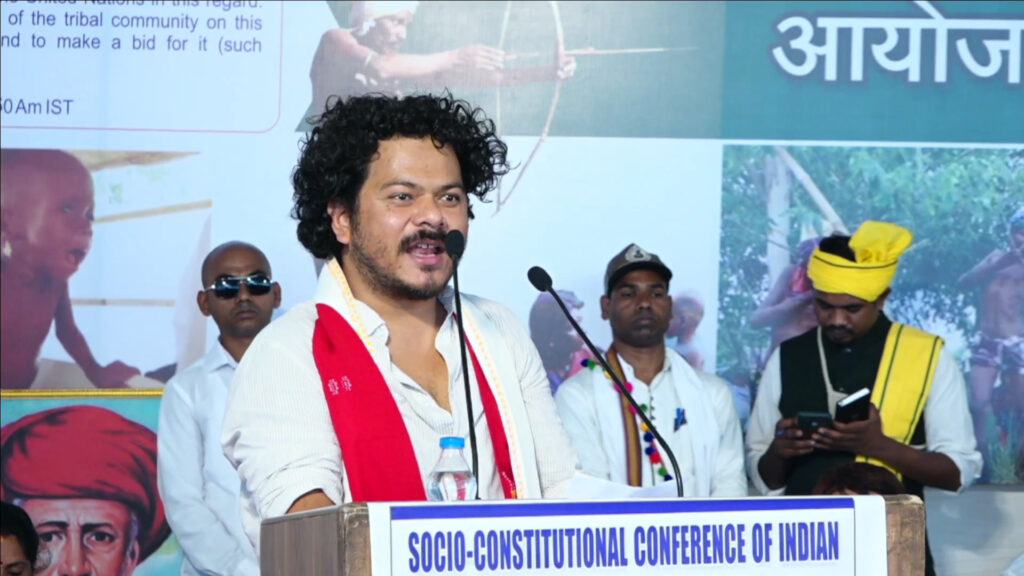
Global Home for Indigenous Peoples established remarkable relationships with the Indian Indigenous Peoples and their leaders. It was inspiring to connect with the Indigenous Peoples movement in India.

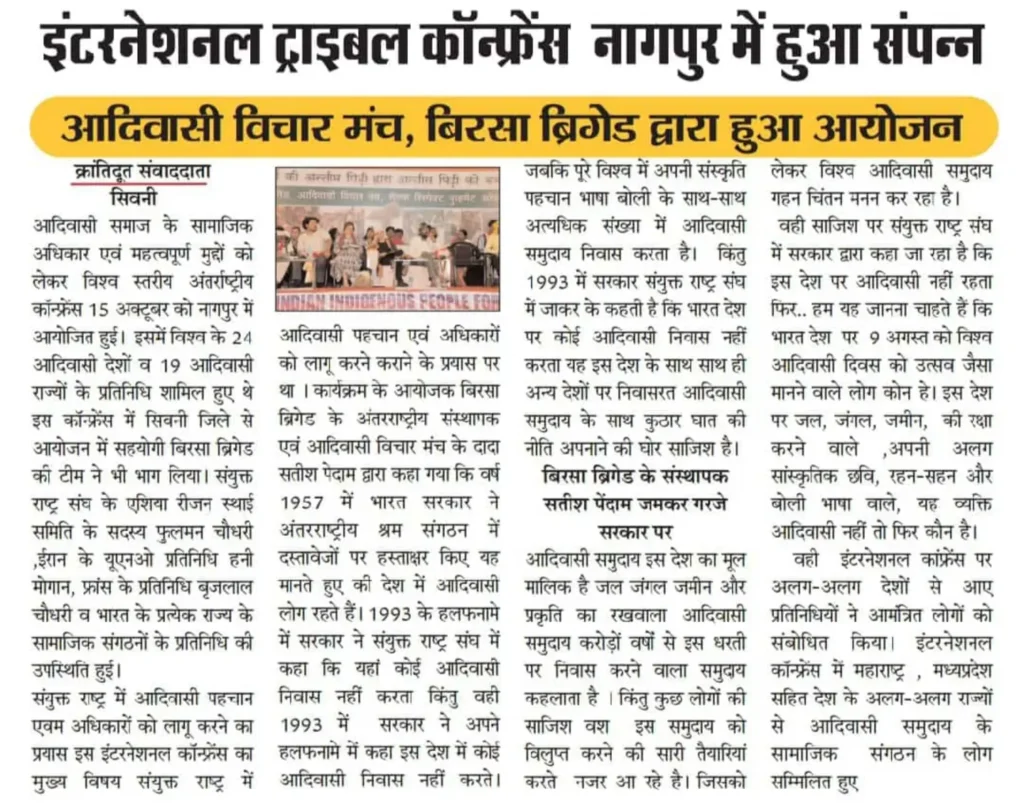
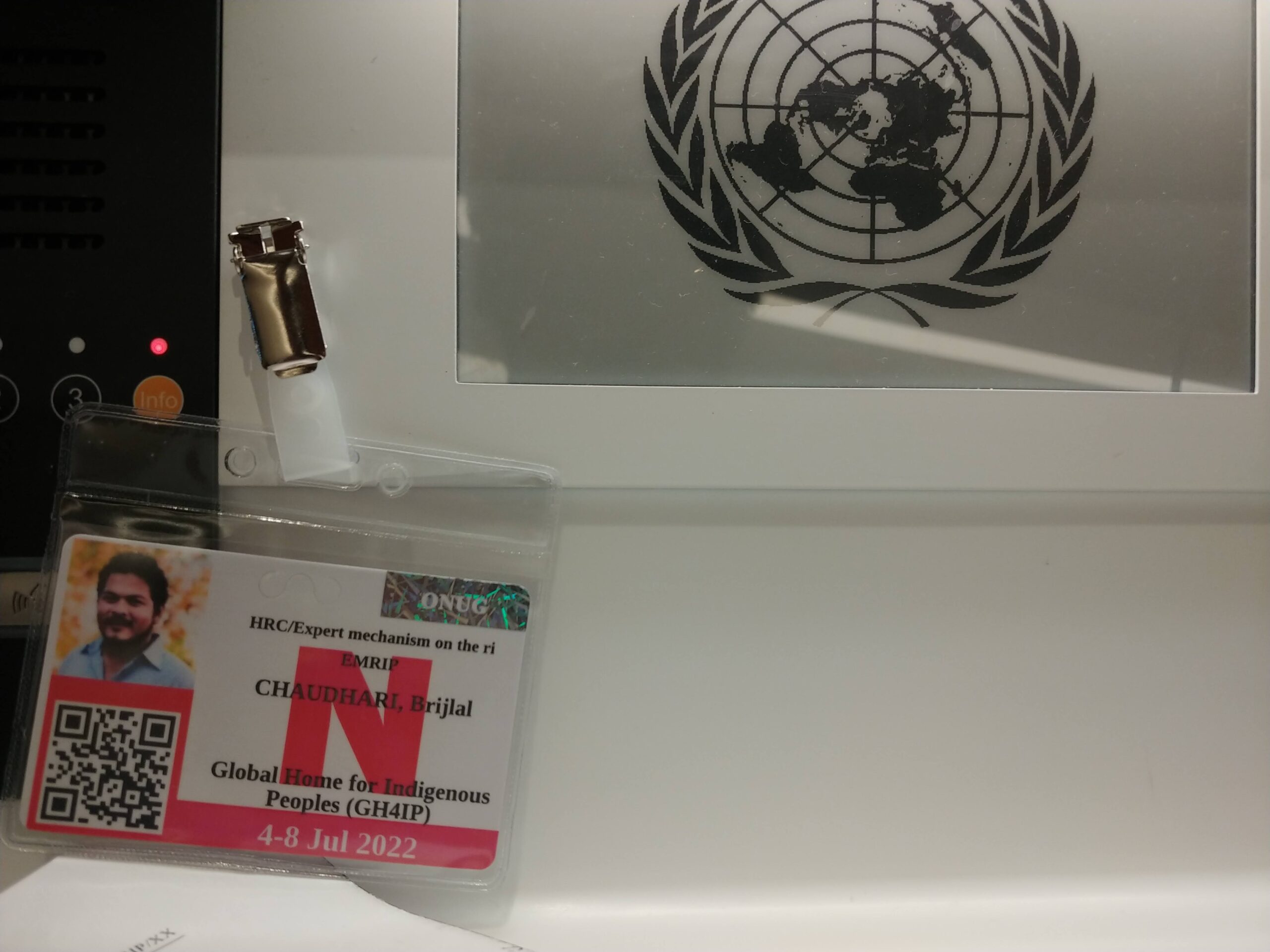
15th Session of the Expert Mechanism on the Rights of Indigenous Peoples (EMRIP)

I represented Global Home for Indigenous Peoples in Geneva from July 4-8, 2022, for the 15th session of the Expert Mechanism on the Rights of Indigenous Peoples. It was powerful moment for me to be in a room full of Indigenous Peoples from all seven socio-cultural regions of the world. Below are the statements that I delivered.
Statement on agenda item #3: Study on Treaties, agreements, and other constructive arrangements, between indigenous peoples and States, including peace accords and reconciliation initiatives, and their constitutional recognition.
Distinguished chair of the EMRIP, representatives of the member states, Indigenous brothers and sisters, and everyone present here physically and virtually, Namaste!
Thank you for giving me the time to speak and share the story about my community.
My name is Brijlal Chaudhari, and I am Tharu nation from Nepal. I would like to bring your attention to Nepal who has ratified ILO Convention no. 169 and adopted the UN Declaration on the Rights of Indigenous Peoples (UNDRIP). However, the government of Nepal has little or no political will to internalize these international laws and mechanisms. As a result, Indigenous Peoples are still waiting to be consulted in creating a national action plan to implement the ILO Convention 169 and the UNDRIP. The Indigenous Peoples of Nepal have not felt any significant changes in their lives and often feel ignored. Indigenous Peoples continue to face systemic discrimination, suppression, assimilation, and criminalization. The policies towards Indigenous Peoples are paternalistic and the government has little interest to reconcile with its Indigenous Peoples.
Now I would like to focus on the Tharu Peoples. Nepal government promulgated its constitution in 2015 without the full and meaningful participation of Indigenous Peoples. The constitution was rushed and had little regards for the rights of Indigenous Peoples. Thus, an autonomous Indigenous Tharu State within the new federal system was not allocated. This killed the dream of Tharu People to self-govern themselves and their right to their land and their territories. As a result, Tharu Peoples were forced to organize a peaceful demonstration to show their frustration with the decision. The peaceful protest turned violent that killed 9 Police officers and a child in Tikapur, Kailali District.
The Tikapur incident is a consequence of years of unfair treatment and structural violence toward the Tharu community. The security forces, including the Home Ministry believed that the violence was premeditated and saw it as a criminal offense. Thus, the security forces responded with violence against the Tharu Peoples. Many Tharu homes and businesses were burned down in Tikapur. The Tharu Peoples who had no relation to the protest were also attacked, tortured, intimidated, arrested, and incarcerated for years.
Subsequently, 11 people were sent to prison for life for their alleged roles in the violence. Upon appeal, the three people were released from the prison. Currently, eight people, including a Member of Parliament from Tikapur, Resham Chaudhary, are serving prison sentences for life.
Following the incident, an independent commission called Laal Commission was formed to document the truth and inform the government. The commission submitted a report to the government, but to this date it has not been made public. By hiding the truth, the government wants to sweep away the Indigenous issues like dirt and continues to suppress the Tharu Peoples’ right to self-determination and self-government by criminalizing our movement. The reaction of the government of Nepal violates the spirit of the ILO Convention No. 169 and the articles of the UNDRIP. The Tikapur incident is a political issue, and the Nepal government should seek a political solution to this issue. The reaction of the Nepal government to this incident shows how Indigenous Peoples’ rights and aspirations are ignored by the Nepal government and there is little room for Indigenous peoples to fully realize their potential.
As an Indigenous Tharu nation I want to feel safe in Nepal and exercise my rights as Indigenous people because I was born in this country. I want my children to grow up in Nepal and feel safe and express their indigeneity. I do not want my children to face discrimination by the State just because they identify as Tharu. Hence, I kindly request this session to urge the Nepal government to:
1. share the Laal Commission Report with the public and use the findings of the report to serve justice to the victims of the incident.
2. immediately release the 8 Tharu political prisoners with respect and compensation.
3. make a formal apology to the families who were arrested, tortured, and jailed for years without any connection to the incident.
4. invite the Special Rapporteur on the Rights of Indigenous Peoples to make an official visit to Nepal and independently investigate the case.
5. undertake a comprehensive legal and policy reform program to advance the implementation of Nepal’s commitments under UNDRIP and ILO Convention 169:
a. by immediately drafting a national action plan to implement the Convention to strengthen the relationships between Indigenous Peoples and the state.
b. by implementing the world conference of Indigenous Peoples’ outcome document by drafting a national action plan to achieve the ends of UNDRIP without any delays.
Once again, thank you EMRIP for this opportunity to share my story.
Thank you!
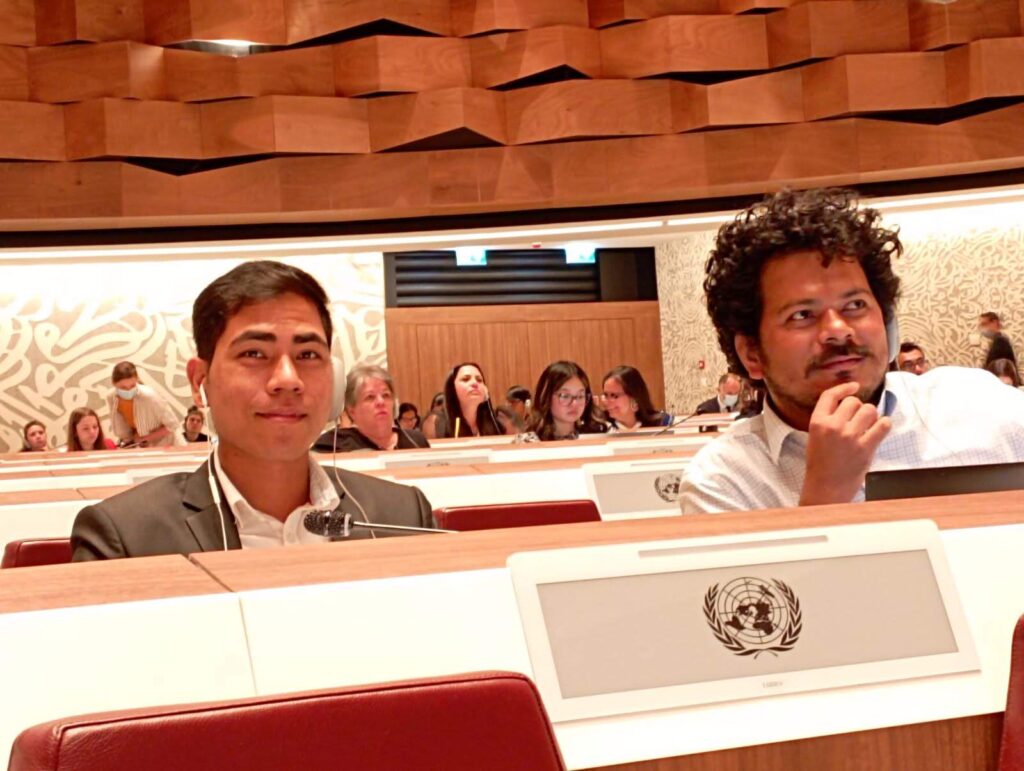
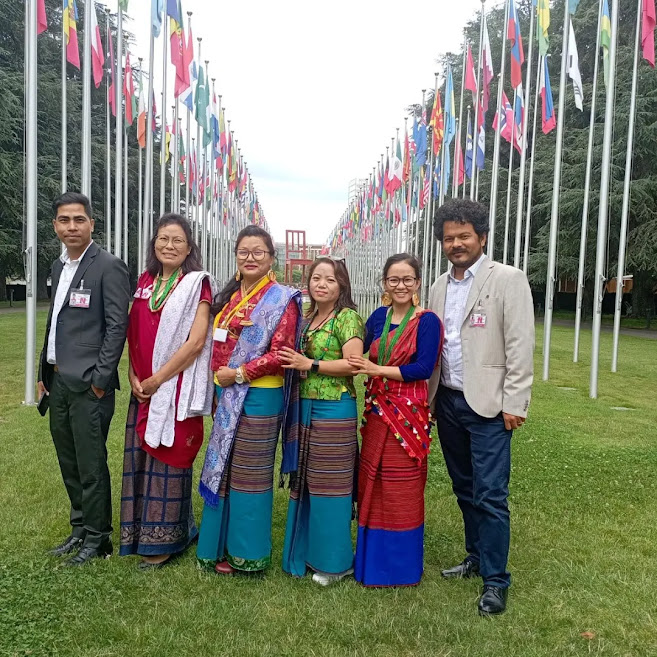
Statement on agenda item #7: International Decade of Indigenous Languages.
Thank you EMRIP and the International Decade of Indigenous Languages (IDIL) Task Force for the work plan. The work plan is instrumental for Indigenous Peoples’ way of life and their cultural sustainability. Such initiative makes me hopeful about our future.
For a moment, I want to take you to all to my family. My grandfather was a Tharu leader. He was denied attending the council of the King of Nepal in 1950 because he did not speak the official language (Nepali). My mother speaks Tharu (an oral language). She does not speak Nepali that creates a disability for her to seek government services. Basically, she does not exist for the state, and the state does not exist for her. The Nepali structure is culturally violent towards Indigenous Peoples and excludes us. Hence, the Nepali structure gave us no choice but to integrate and assimilate with the dominant culture that has continued to rule the country.
Such a situation created a lot of pressure and shame in the family. I was sent to school where I learned in Nepali. My family wanted me to integrate into the Nepali system and not be discriminated and marginalized. And I did. It took me away from my family when I was ten. I received an education, but I lost the time I could have had with my family, especially my grandfather, who held much Tharu oral knowledge that was transmitted to him by his ancestors.
Nepal is a multicultural state and over 35 percent of the population is Indigenous. Nepal is proud of its multicultural society and benefits tremendously when it comes to advertising for its Tourism goals and targets. The government of Nepal exhibits Indigenous Peoples in the ethnographic museum in Kathmandu to showcase the diversity offers. However, Nepal lacks a clear vision for a multilinguistic society and to create a culturally vibrant society that is rooted in the celebration of diversity. Similarly, the education system does not support multicultural education or provide education in Indigenous languages. Nepal is still suppressing the growth and development of Indigenous Languages. With the loss of Indigenous languages, we are losing traditional knowledge that are coded in our oral language.
Indigenous Peoples’ culture and traditions and languages are struggling to thrive as the dominant culture and language squeeze Indigenous languages. In Nepal, we have the right to open a radio station in our own languages, but the state is too slow to teach the Indigenous languages in the schools and provide services in the Indigenous languages including while seeking justice.
Through this session, I kindly recommend member states to pay serious attention to the International Decade on the Indigenous Languages: Global Action Plan and create a national policy in full collaboration with the Indigenous Peoples to protect and promote the Indigenous Languages of Nepal for future generations.
I would also recommend that we create an Indigenous Languages Map as well as invest in their revitalization, promotion, and protection.
Thank you!
Enhancing Indigenous Peoples Participation at UN Human Rights Council
I will be participating in the expert workshop on possible ways to enhance the participation of Indigenous Peoples in the work of the Human Rights Council in Geneva on Nov 21-24, 2022. Below is my written contribution that I submitted to OHCHR.
During the 15th Session of Expert Mechanism on the Rights of Indigenous Peoples (EMRIP) that was held on July (4-8), 2022, one of the board members of the Voluntary Fund for the Indigenous Peoples shared about the fund. The board member proudly stated that the fund had supported hundreds of Indigenous Peoples to participate in the Human Rights Council (HRC) work. I want to take this opportunity to thank the UN member States who have contributed to the fund and continue to support it. My gratitude also goes to all the board members for their hard work in managing the fund to ensure that Indigenous Peoples are present in the UN forum, especially within HRC.
The participation of the Indigenous Peoples in the UN mechanisms especially in the work of the HRC is fairly recent as Indigenous Peoples and their issues were not a priority. We need to remind ourselves that, the UN (previously known as the League of Nations) had denied access to Haudenosaunee Chief Deskaheh (in 1923) who wanted to speak to the League of Nations and defend the rights of his people to live under their own laws, on their own land, and under their own faith. A similar journey was made by Maori religious leader T.W. Ratana. To protest the breaking of the Treaty of Waitangi concluded with the Maori in New Zealand in 1840 that gave Maori ownership of their lands, Ratana first traveled to London with a large delegation first to petition King George, but he was denied access. He then sent part of his delegation to Geneva to the League of Nations and arrived there later himself, in 1925, but was also denied access.
With the adaptation of ILO’s Indigenous and Tribal Peoples Convention No. 69 of 1989, Indigenous issues started to be visible on the global stage, and doors started to open for Indigenous Peoples and their voices (both nationally and internationally). Similarly, the creation of the United Nations Voluntary Fund for Indigenous Peoples in 1985 opened the doors for Indigenous Peoples to participate in discussions that affect them. Since then, Indigenous Peoples have had opportunities to participate in different spaces within the work of HRC. Consequently, we have the United Nations Declaration on the Rights of Indigenous Peoples (UNDRIP) which was widely supported by the UN member States in 2007.
Today, Indigenous Peoples have access to numerous platforms within the Human Rights Council, where they can participate and express their concerns without being judged. To sustain the impacts of UNDRIP, and the milestones achieved together by Indigenous Peoples and HRC in safeguarding and promoting their rights, it is crucial that Indigenous Peoples continue to actively participate in the work of HRC. The implementation of the UNDRIP is a work in progress however, the pace is slower. With the speed at which the UN Member states, UN Bodies & programs, and private sector or business are integrating and domesticating the UNDRIP, it might take longer for Indigenous Peoples to enjoy their full rights as self-determined peoples. HRC might have to declare another decade for Indigenous Peoples.
In this context, a continued participation of Indigenous Peoples is essential in safeguarding and promoting their rights. Moreover, HRC can take the following steps listed below to increase the impact on wider Indigenous Peoples and support them in further protecting and promoting their rights.
Voluntary Fund for Indigenous Peoples
As per its report, the fund claims that only 1⁄3 of the applicants receive the fund. With the rising debates and talks on the rights of Indigenous Peoples, the fund should grow exponentially or at least proportionally to allow a higher number of participations of Indigenous Peoples to compensate for the time Indigenous Peoples were denied access to the United Nations. In addition, Asia is home to 2⁄3 of the Indigenous Peoples of the world and thus population size should be considered undeniably while disbursing/allocating funds. The fund is for Indigenous Peoples; hence the board of the fund should publish its financial report each year (not just to the donors). This is not only because Indigenous Peoples have the right to know about the fund but for transparency and accountability to those who it should serve.
Special Rapporteur on the Rights of Indigenous Peoples
There is only one mandate holder for about 479 million Indigenous Peoples living in 90 countries. Considering the gravity of the human rights violations around the world with regards to Indigenous Peoples’ rights and rising incidents against Indigenous Peoples, be it in a small Indigenous rich village of Nepal in Asia or the Amazonia region of Latin America, HRC must appoint Special Rapporteur for each geographical regions for a larger and effective engagement with the Indigenous peoples of each region. The issues in each region could be more prioritized and lead to a wider impact by speeding up the actions.
Expert Mechanism on the Rights of Indigenous Peoples
The 5-day event each year in Geneva is a unique opportunity for Indigenous Peoples from all geographical regions to share their challenges, and issues with the UNPFII members and the members of the EMRIP. Since its establishment, EMRIP has accumulated much research and recommendations; however, there is little to insignificant follow-up on the items recommended. Engaging Indigenous Peoples could be one viable strategy to bring Indigenous Peoples’ perspectives and maintain a continuum of follow-up on the recommendations by OHCHR.
Indigenous Fellowship and Senior Fellowship
Both fellowships are unique opportunities for Indigenous Peoples to acquire deeper insights into the rights of Indigenous Peoples. The fellowship is quite an empowering experience; however, due to COVID restrictions, the OHCHR has not accepted any fellows recently. At the soonest possible, OHCHR should resume the fellowship so that Indigenous Peoples are not left behind due to the limited opportunities that they have as such. Additionally, OHCHR can have an incremental impact on such fellowships by twofold if Indigenous fellows are invited to be part of the fellowship in their own region. This strategy could promote the “think locally, grow globally” concept. Furthermore, encourage the past fellows in the region to join and facilitate such that there is continuity in knowledge and talent sharing. Working with Indigenous organizations in the region to facilitate such events would be a viable option. We can take the lead to organize Indigenous Fellowship Program in each geographical region to reach more Indigenous Peoples. Hence, each year organize 7 regional Indigenous Fellowships (25 fellows per region x 7 regions = 175 Indigenous Fellows), 1 in Geneva (25 Fellows). In total, each year the OHCHR could provide opportunities to 200 Indigenous Fellows. Senior Indigenous Fellowship opportunities can be opened in the regional headquarters of OHCHR including one in Geneva (minimum of one fellow from each geographical region).
Universal Periodic Review (UPR)
The existing UPR restricts Indigenous Peoples organizations without ECOSOC consultative status to participate in the UPR meetings. This in fact limits a significant number of institutions that work in the field of Indigenous Peoples’ rights and well-being. It would be better to find an alternative verification mechanism to engage Indigenous Peoples and their organizations without ECOSOC consultative status.
Online Courses for Capacity Building
OHCHR has started online courses that Indigenous Peoples can take online and continues to expand on the e-learning curriculum by involving Indigenous peoples at all levels of curriculum development. OHCHR can also develop training that raises awareness about Indigenous Peoples’ governance systems, law, and land tenure. There is a significant scope to expand on this initiative to provide courses in various languages. To begin with, OHCHR can start translating courses into the languages of the larger population size and wider language spoken by the Indigenous Peoples.
Regional and National Engagements
There is a significant scope for OHCHR country offices and regional offices to engage more with the Indigenous Peoples and facilitate the dialogue between the State agencies and the Indigenous Peoples. This would foster a relationship between two parties and reduce unforeseen or avoidable conflicts or the timely resolution of potential conflicts.
Recruitment of Indigenous Peoples at HRC
To fully internalize the principles of UNDRIP, HRC/OHCHR should actively audit its HR policies and recruitment trends. Increase the Indigenous Peoples as staff in the HQ or regional offices or national offices. Similarly, Indigenous organizations should be also prioritized for short-term contracts and consulting opportunities at all levels to work with Indigenous Peoples.
Treaty Bodies of HRC
There are almost 10 Treaty bodies in HRC. HRC needs to ensure that the committees leading the treaty bodies should also touch on issues related to Indigenous Peoples. Similarly, the committee should also meaningfully involve Indigenous peoples. Similarly, the treaty bodies that directly involve the rights of Indigenous Peoples should nominate Indigenous experts to their committees.
- « Previous
- 1
- 2
